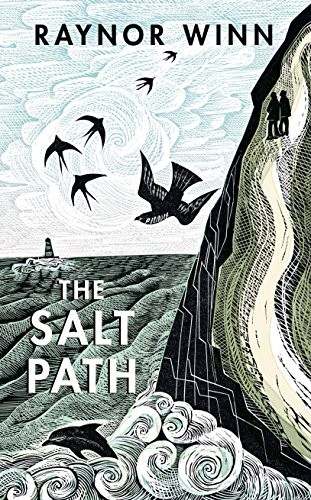Stephanie Jane reviewed The Salt Path by Raynor Winn
Inspirational!
5 stars
A friend lent us a copy of The Salt Path, insisting that we would love the read although its 'Sunday Times bestseller' claims didn't appeal to me munch. However, once my partner read and enthused about Raynor Winn's writing and journey, I was encouraged to try this book for myself. I was pleasantly surprised to find I loved it too! Winn was inspired by 500 Mile Walkies by Mark Wallington which I know I've read too, but so long ago that even my Goodreads doesn't know about it. Left homeless and almost destitute by the unjust English legal system, the Winns' decision to walk one of Britain's most physically difficult paths seemed to be madness, but turned out to probably be the best choice they could have made.
Winn makes a lot of very good points about homelessness throughout The Salt Path, especially about the way non-homeless people react …
A friend lent us a copy of The Salt Path, insisting that we would love the read although its 'Sunday Times bestseller' claims didn't appeal to me munch. However, once my partner read and enthused about Raynor Winn's writing and journey, I was encouraged to try this book for myself. I was pleasantly surprised to find I loved it too! Winn was inspired by 500 Mile Walkies by Mark Wallington which I know I've read too, but so long ago that even my Goodreads doesn't know about it. Left homeless and almost destitute by the unjust English legal system, the Winns' decision to walk one of Britain's most physically difficult paths seemed to be madness, but turned out to probably be the best choice they could have made.
Winn makes a lot of very good points about homelessness throughout The Salt Path, especially about the way non-homeless people react to those they perceive to be vagrants. Centuries of propaganda have taught us to fear and villify people who have nothing, almost as though their status is a contagious disease. Raynor and Moth swiftly learned that letting others assume they had sold their home and were walking by choice made them brave adventurers and an inspiration. Admitting the reality of their situation had people immediately shunning the pair like they were lepers. As I remember from reading Down And Out In Paris And London, by George Orwell, societal attitudes are one of the biggest barricades to homeless people pulling themselves back up and, despite the problem increasing rapidly over the past decade and it genuinely being something that can happen to pretty much anyone, but the most affluent.
Moth's grim health diagnosis was perhaps a stronger concern though and I was amazed by how much of a benefit the daily walking regime was to his supposedly irreversible condition. A keen walker myself, albeit generally in places with fewer hills than the South West Coast Path, I can also attest to the physical and mental benefits of walking, but to see the transformation in someone who could barely shuffle at the start of their journey, was incredibly inspirational. Both my partner and I are now harbouring vague ideas of a similar undertaking, even though we are put off by the tent camping hardships that Raynor and Moth tolerated. It's a rare hike now though that one of us doesn't point to a secluded hollow, suggesting that a little tent could discreetly be pitched there for a night.
Raynor's prose is wonderfully engaging and I loved her poetic flights as aspects of the natural world around them capture her imagination. I read the whole book quickly - too quickly as it turned out because I was sad to see it finish. I appreciated her humour throughout as well as her honesty in portraying the realities of their situation. Hopefully The Salt Path's popularity will have gone some way towards undermining homeless discrimination in the UK as well as encouraging people to experience for themselves the benefits of regular walking in natural spaces. I'm now actively keeping a lookout for Winn's follow-up work, The Wild Silence, and I wonder if the couple have met Simon Armitage yet?






